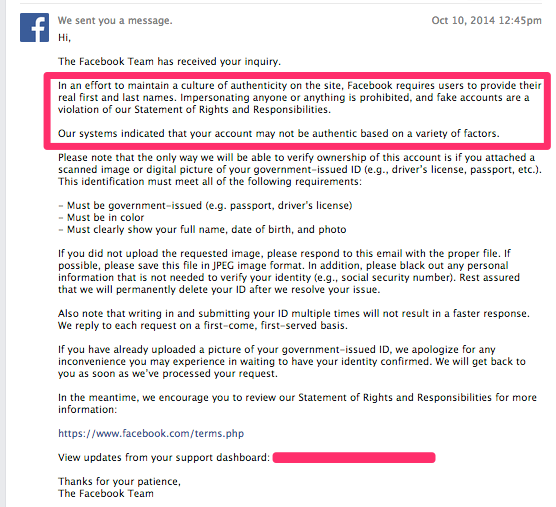Update: Within 24 hours of writing this post, Facebook restored my account. I am happy for this but the problem for Facebook’s identity authentication still exists. It is my hope that engaged thinkers around network identities will continue to put forth potential solutions to these emerging and difficult problems.
You may have read my previous posts about scammers using my personal photos to construct fake identities for the purpose of entering into online romantic relationships with women and defrauding them out of money or goods. If not, here’s the original post which outlines the problem and here is the followup.
Over the better part of seven years, I have notified and reported hundreds of fake profiles, some that have been made up of my name and photos, and others comprised of my photos and alternate names. These profiles have shown up on sites such as Twitter, VK.com, Match.com, Christian Mingle, and most prominently, Facebook. At any given time, there are at least three fake Alec Couros’ on Twitter or Facebook, and likely dozens if not hundreds of others that I do not know about. It has been a frustrating game of wack-a-mole. The other discouraging piece is that many women (at least one per week on average) continue to report to me that they have been scammed, or nearly scammed, by these criminals. In many cases, even when there isn’t a loss of money, there is certainly a high incidence of heartbreak and hurt.
And, while I have successfully had Facebook take down hundreds of profiles, apparently they no longer believe that I am Alec Couros. My Facebook account has been suspended as seen by the notice shared below.
I’ve submitted my government ID with the hope that this will be resolved soon. However, this is incredibly frustrating. My assumption was that a Facebook account that is 7+ years old with over 2000 friends and hundreds of posts would have had some weight in terms of authenticity. I assume also that my profile has been taken down by one of the very scammers that I have been reporting, likely from an account that is fairly new (less than a few months old) and connected to a limited number of friends.
But mostly, I’m really frustrated because the response from Facebook on romance scamming has been entirely absent. Through messages sent through reporting dozens of these fake profiles, I have been regularly, and perhaps naively, offering Facebook my services (for free) to better help them envision a way that they can fix their reporting and authentication system. I am more than happy to pay my way to get to Facebook HQ (or wherever I need to be) to sit down with people and help them fix this. And while, part of this is selfish (I want this 7+ year problem solved once and for all), I really do want to fix this for others.
Addendum:
As an addendum to this post, I want to share my reasons for even wanting a Facebook account. I know that there are countless reasons to quit Facebook altogether. I have thought about closing it down many times. However, I have continued to use Facebook for three main purposes:
- I enjoy it. Still. I connect with people there that I do not connect with in any other place. And I enjoy what they have to share. Although there is much content that can be annoying, I feel that Facebook still connects me to people I know well, and people that I want to know more about, in ways that other spaces do not easily allow.
- My timeline is meaningful. I regularly look back through my timeline to see what I have posted, and it gives me a sense of who I am and who I have become. Interactions that I’ve had with friends in Facebook still make me laugh and make me cry. My message history, for instance, includes conversations I’ve had with hundreds of people, including my dad. I don’t want to lose those meaningful artefacts.
- I’ve used it to verify who I am. Due to the fact that my profile was long-standing and well-connected, the profile seemed from the outside as being more authentic. Thus, this was the place where many of the romance scam victims felt safe to come forward and trust that I am who I say I am. In this way, Facebook helped me protect my identity. While, I’d rather have my identify authenticated through other personally-controlled spaces (like this blog), for many of these victims, my Facebook profile felt like a familiar and trustworthy space.
So, I don’t do this often, but could I ask you to share this post? Certainly, I want my profile restored, and perhaps I’ll only have to wait a few days for this to happen. But more so, I want to help Facebook recognize, remedy, and acknowledge this huge problem that they have with romance scams. Facebook’s identity authentication is broken and it needs to be fixed. And daily, people are being hurt and scammed because of this problem.
Thanks for listening,
The ‘real’ Alec Couros

